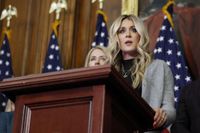On February 5, 2025, President Donald Trump signed an executive order titled “Keeping Men Out of Women’s Sports,” prohibiting transgender women and girls from participating in women’s collegiate sports governed by the National Collegiate Athletic Association (NCAA). This move marks a significant promise fulfilled in Trump’s 2024 presidential campaign and comes amidst a wider national debate on inclusivity in sports.
The NCAA oversees around 1,100 American universities, and noncompliance with this order could result in loss of federal funding. NCAA President Charlie Baker stated on February 6 that Trump’s order establishes a necessary national standard amidst the varying state laws that have emerged on this issue. In a statement, Baker said, “We strongly believe that clear, consistent, and uniform eligibility standards would best serve today’s student-athletes instead of a patchwork of conflicting state laws and court decisions.” This is an area where the rules of eligibility have been marred by local dissension.
According to a recent poll from the New York Times and Ipsos, nearly 80% of Americans do not support transgender female athletes competing in women’s sports. Many among the public echo sentiments expressed by politicians like U.S. Representative Nancy Mace (R-S.C.), who noted in a press release dated February 4 that “men are biologically different from women.”
The executive order has gained notable support from individuals like Riley Gaines, a former University of Kentucky swimmer and a prominent conservative activist. After attending the signing ceremony, she expressed her approval on social media, stating, “I can’t even begin to tell you how vindicating it feels knowing no girl will ever have to experience what my teammates and I did.” Her experiences stem from having to share a podium with a male swimmer, a moment that has fueled her advocacy against trans women in sports.
However, not all athletics coaches and officials agree with blanket bans. Chris Crader, a varsity girls’ volleyball coach, voiced that the situation is complex. “I don’t feel like the government needed to make a blanket rule, but I also think the NCAA is in a pretty weak state right now,” he remarked. Crader also suggested that alternate solutions may work better, suggesting sport-specific criteria rather than a universal standard as each sport has different dynamics affecting athlete performance.
This executive action is met with resistance from the transgender community and advocates. Two high school students from New Hampshire, Parker Tirrell and Iris Turmelle, are currently pursuing legal action against the executive order, claiming it discriminates against their rights to participate in sports. Their lawyers from GLBTQ Legal Advocates & Defenders and the American Civil Liberties Union (ACLU) of New Hampshire filed an amendment to their initial complaint to include challenges against Trump’s executive order on February 12. Chris Erchull, a Senior Staff Attorney at GLAD Law, articulated the stance that the order symbolizes a wider pattern of exclusion against transgender individuals, saying, “The Trump Administration’s executive orders amount to a coordinated campaign to prevent transgender people from functioning in society.”
Concerns regarding the effects of such bans on the mental health and participation of transgender athletes have also been raised. Dr. Audriana Mooth, a sports medicine fellow at Stanford University, emphasized that gender-affirming care diminishes the athletic advantages of transgender women, and noted that, “From a medical standpoint, we don’t have data to support banning transgender athletes from women’s collegiate sports in regards to athletic performance or advantage.” She maintained that sports participation significantly contributes to improved mental health for transgender individuals.
Furthermore, while there is debate surrounding the advantages of transgender women athletes, a study published in the British Journal of Sports Medicine indicates that after transitioning, these athletes do not exhibit the performance advantages many assume they retain. The researchers pointed out the necessity for ongoing studies to better understand this issue.
In a further development, educational institutions in Maine have recently complied with the executive order, agreeing to the ban on trans athletes after Trump threatened to withhold state funding. Riley Gaines vocally supported these measures, citing it as a win for women’s sports. Interestingly, previous attempts by Maine to legally challenge Trump’s order reflect the ongoing contentiousness of the issue, demonstrating the complexities that lie within state and federal regulations over sports participation.
Gaines has been a prominent figure in this debate since campaigning against the inclusion of transgender athletes in women’s sports since 2022. She has also been involved in suing the NCAA over its alleged bias in favor of transgender athletes. Her firm position resonates with broad segments of the public who feel similarly, as covered by public opinion polls and legislative debates.
Ultimately, opinions remain polarized on this topic. As dialogue continues, various stakeholders highlight the need for compassion and understanding in discussions about sports inclusion and equity. Crader’s reflection counters the hard line drawn by supporters of the executive order, saying,






